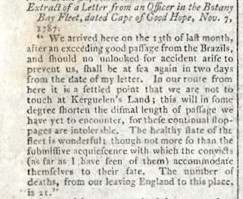[Editor: This brief news item, about the voyage of the First Fleet, is an extract from the “Postscript: London” section published in the The London Chronicle (London, England), 29 April 1788.]
Extract of a letter from an officer in the Botany Bay Fleet, dated Cape of Good Hope, Nov. 7, 1787.

In our route from here it is a settled point that we are not to touch at Kerguelen’s Land; this will in some degree shorten the dismal length of passage we have yet to encounter, for these continual stoppages are intolerable.
The healthy state of the fleet is wonderful; though not more so than the submissive acquiescence with which the convicts (as far s I have seen of them) accommodate themselves to their fate. The number of deaths, from our leaving England to this place, is 21.”
Source:
The London Chronicle (London, England), 29 April 1788, p. 416, column 1
Editor’s notes:
Botany Bay = a bay located to the south of the City of Sydney (New South Wales), located in the south-eastern section of Sydney’s greater metropolitan area; it was discovered in 1770 by the English explorer James Cook (1728-1779); Botany Bay was intended as the location for the first British settlement in Australia, but Governor Arthur Phillip (1738-1814) decided that the area was unsuitable, and instead founded the settlement further north, in Sydney Cove (in Sydney Harbour, Port Jackson, New South Wales), but, despite the change of location, the settlement was often referred to as “Botany Bay” for many years
See: “Botany Bay”, Wikipedia
Botany Bay Fleet = the First Fleet: a British fleet of eleven ships, which transported convicts, officials, and military personnel to New South Wales, in order to establish a colony; the fleet left England in May 1787, and arrived in Sydney (NSW) in January 1788
See: “First Fleet”, Wikipedia
Cape of Good Hope = a rocky promontory on the southern Atlantic coast of South Africa
See: “Cape of Good Hope”, Wikipedia
Kerguelen’s Land = the Kerguelen Islands, a group of islands in the sub-Antarctic, lying southward of the approximate middle point between Cape Leeuwin (Western Australia) and the Cape of Good Hope (South Africa), and just to the north of Heard Island and the McDonald Islands
See: “Kerguelen Islands”, Wikipedia
[Editor: The original text has been separated into paragraphs.]
Leave a Reply